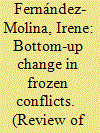|
|
|
Sort Order |
|
|
|
Items / Page
|
|
|
|
|
|
|
| Srl | Item |
| 1 |
ID:
164985


|
|
|
|
|
| Summary/Abstract |
This article proposes a typology of causal mechanisms whereby transnational relations of recognition constitute conflict actors in frozen conflicts. While the agency of an emerging conflict actor manifests itself in ‘struggles for recognition’ motivated by experiences of ‘disrespect’, responses from different significant others vary in terms of motivations and pathways (mechanisms of recognition). Adapting Honneth’s tripartite division, the typology distinguishes between four forms of recognition: thin cognitive recognition, ‘respect’/rights, ‘esteem’/difference, and ‘love’/empathy. Three transnational corrections are made in order to include transnational relations of recognition, non-state actors, and unstructured social-relational forms of international/transnational recognition. The typology is applied to the conflict of Western Sahara, which has been reshaped by the rise of internal Sahrawi pro-independence groups (based inside the territory annexed by Morocco) as an increasingly relevant conflict actor, with their identity shifting from victims to human rights activists to activists involved in an unsolved conflict. This identity and social-status formation has been the product of transnational recognition from three significant others: the annexing state (Morocco), the contested state-in-exile (SADR), and the international community. The overall effect of intermingling recognition processes, including various instrumental initiatives deprived of mutuality, has been increased struggle and conflict complexity rather than ‘recognitional peace’.
|
|
|
|
|
|
|
|
|
|
|
|
|
|
|
|
| 2 |
ID:
162488


|
|
|
|
|
| Summary/Abstract |
In this article, the introduction to this Special Issue, we underline the importance of the dynamics of misrecognition for the study of world politics. We make the case for shifting the focus from ‘recognition’, where it has long been cast in social, political and, more recently, International Relations theory, to misrecognition. We do so by returning to the original theorisation of misrecognition, Hegel’s dialectic of the master and servant. Our point of departure is not only that the desire for recognition is key social dynamic, but that the failure to obtain this recognition is built into this very desire. It is a crucial factor for understanding how international actors behave, including, but not only, states.
Thus understood, the desire for recognition is not simply a desire for social goods, for status or for statehood, but for more agency – more capacity to act. We explore the logic of misrecognition and show how the international system is a symbolic structure that is ordained by an unrealisable ideal of what we call ‘sovereign agency’.
|
|
|
|
|
|
|
|
|
|
|
|
|
|
|
|
| 3 |
ID:
092315


|
|
|
|
|
| Publication |
2009.
|
| Summary/Abstract |
This paper draws on two academic articles that highlight the need to resolve the violence of 'spoilers', i.e. armed political factions that could spoil a negotiated end to conflict. They both make interesting contributions within their own field of peacekeeping literature but we think that their proposed agenda, which is the study of 'spoilers', can be improved with the incorporation of Axel Honneth's 'Recognition Theory'. While we do not wade into the deeper debate about recognition theory, we think that the basic tenets of this theory can help improve the analysis of spoiler theory and, consequently, the prescriptions for its usage in the context of resolving ongoing violence in Iraq. Based on our own rereading of 'spoiler theory' we will argue for the benefits of incorporating informal negotiations into the formalised debate that is currently taking place in Iraq's political institutions.
|
|
|
|
|
|
|
|
|
|
|
|
|
|
|
|
|
|
|
|
|